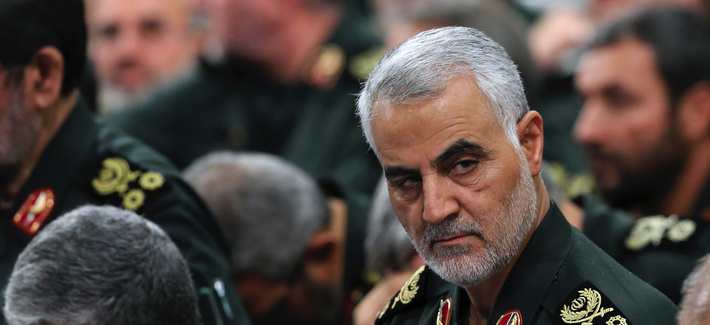GV students explore misinformation, memes after Iranian general killed by US airstrike
Jan 13, 2020
Tension between the United States and Iran escalated even further this month when President Donald Trump ordered a drone strike in Baghdad, killing several military officials, including revered Maj. Gen. Qassim Suleimani.
As classes started up this past week, Grand Valley State University students were left wondering what would come next. Their hypotheses, like many 18-29 year olds, are largely guided by social media and partisan echo chambers.
Ben Rozema, Vice President of the GV College Democrats, along with President Lauren Rademacher, believe that the order to kill Suleimani was “miscalculated and irresponsible,” and could result in severing the already-fragile diplomatic ties between the two nations.
On the other side of the aisle, GV College Republicans Co-Chairman Dorian Thompson believes the attack was completely justified. Thompson, who called Suleimani “a murderous thug,” said that he supported the President’s decision because “he’s killed our soldiers, he’s killed innocent Americans.”
“We want peace,” Thompson said. “But we will defend ourselves when we need to.”
Students on both sides of the political spectrum recognize their opinions are fueled by their personal biases and the echo chambers that reinforce their views.
“I haven’t really come across too many dissenting opinions on [the issue],” Rademacher said. “But then again, people who have dissenting opinions aren’t really in my circle.”
Thompson reiterated this point.
“You’ve got a portion of students who are liberal, a portion who are conservative, and a large portion of students who don’t care,” Thompson said.
The politically apathetic students on campus, he said, are mostly echoing concerns they’ve seen on social media. Thompson said many have come to him directly, asking if they should be worried about being drafted into the next World War.
Rademacher and Rozema have heard these same concerns around campus. The drone strike, Rademacher said, “has caused a lot of panic and people have been scared. Of course, there’s all this discourse on Twitter where people are worried about World War III.”
GVSU Professor of Middle Eastern Studies Gamal Gasim said war with Iran, while not completely out of the question, is highly unlikely due to both economic and political reasons.
“The killing of Suleimani is not a declaration of war,” Gasim said. Rather, it was merely the latest development of almost 70 years of unrest between the two nations.
Iranian-U.S. conflict stretches as far back as 1953, when the CIA orchestrated a coup d’etat that resulted in the removal of Iran’s democratically elected Prime Minister Mohammad Mossadegh and placed power back into the hands of the shah, who ruled the country for another 25 years.
Since then, intense tension between the two countries has come in waves, from the 1979 Iranian hostage crisis to President Obama’s lack of foreign aid during the uprisings of the Arab Spring.
In understanding this complex history, Gasim said Americans tend to make oversimplifications about the current state of instability in the region and forget their involvement in creating that fragility.
“By invading Iraq, by supporting dictatorships, by undermining democracy, whether in Iran or in other places, America never supported democracy in the region,” Gasim said.
Moving forward, Gasim said everyone should be more cognizant of the sweeping generalizations Americans tend to make about the Middle East and folks of Middle Eastern descent, which can lead to the rampant spread of misinformation and hate. GVSU students are hoping for the same.
“My fear is that if we go to war with Iran, we’ll kind of see what happened during the 9/11 attacks where there is this animosity towards people from the Middle East… (which is) a negative thing, especially to have on campus,” Rozema said.
Thompson called on students to stop solely getting their information from social media, where he has seen a lot of misinformation over the past week.
“We need to go back to verifying our news,” Thompson said.























